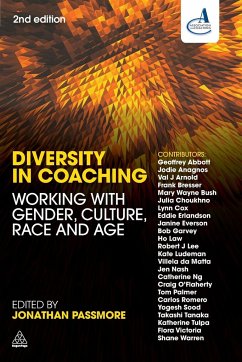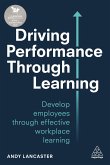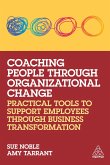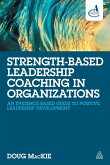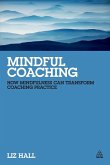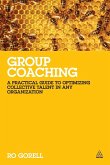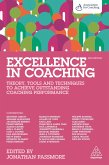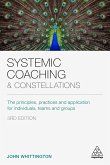Jonathan Passmore, Association For CoachingWorking with Gender, Culture, Race and Age
Diversity in Coaching
Working with Gender, Culture, Race and Age
Herausgeber: Passmore, Jonathan
Jonathan Passmore, Association For CoachingWorking with Gender, Culture, Race and Age
Diversity in Coaching
Working with Gender, Culture, Race and Age
Herausgeber: Passmore, Jonathan
- Broschiertes Buch
- Merkliste
- Auf die Merkliste
- Bewerten Bewerten
- Teilen
- Produkt teilen
- Produkterinnerung
- Produkterinnerung
Diversity in Coaching explores the implications on coaching of gender, generational, cultural, national and racial diversity.
Andere Kunden interessierten sich auch für
![Driving Performance through Learning Driving Performance through Learning]() Andy LancasterDriving Performance through Learning26,99 €
Andy LancasterDriving Performance through Learning26,99 €![Coaching People Through Organizational Change: Practical Tools to Support Employees Through Business Transformation Coaching People Through Organizational Change: Practical Tools to Support Employees Through Business Transformation]() Sue NobleCoaching People Through Organizational Change: Practical Tools to Support Employees Through Business Transformation45,99 €
Sue NobleCoaching People Through Organizational Change: Practical Tools to Support Employees Through Business Transformation45,99 €![Strength-Based Leadership Coaching in Organizations Strength-Based Leadership Coaching in Organizations]() Doug MacKieStrength-Based Leadership Coaching in Organizations44,99 €
Doug MacKieStrength-Based Leadership Coaching in Organizations44,99 €![Mindful Coaching Mindful Coaching]() Liz HallMindful Coaching44,99 €
Liz HallMindful Coaching44,99 €![Group Coaching Group Coaching]() Ro GorellGroup Coaching44,99 €
Ro GorellGroup Coaching44,99 €![Excellence in Coaching Excellence in Coaching]() Jonathan PassmoreExcellence in Coaching52,99 €
Jonathan PassmoreExcellence in Coaching52,99 €![Systemic Coaching and Constellations Systemic Coaching and Constellations]() John Whittington (Coach, facilitator, author)Systemic Coaching and Constellations31,99 €
John Whittington (Coach, facilitator, author)Systemic Coaching and Constellations31,99 €-
-
-
Diversity in Coaching explores the implications on coaching of gender, generational, cultural, national and racial diversity.
Hinweis: Dieser Artikel kann nur an eine deutsche Lieferadresse ausgeliefert werden.
Hinweis: Dieser Artikel kann nur an eine deutsche Lieferadresse ausgeliefert werden.
Produktdetails
- Produktdetails
- Verlag: Kogan Page Ltd
- 2 Revised edition
- Seitenzahl: 312
- Erscheinungstermin: 1. Mai 2013
- Englisch
- Abmessung: 234mm x 156mm x 17mm
- Gewicht: 480g
- ISBN-13: 9780749466626
- ISBN-10: 0749466626
- Artikelnr.: 36126242
- Herstellerkennzeichnung
- Libri GmbH
- Europaallee 1
- 36244 Bad Hersfeld
- gpsr@libri.de
- Verlag: Kogan Page Ltd
- 2 Revised edition
- Seitenzahl: 312
- Erscheinungstermin: 1. Mai 2013
- Englisch
- Abmessung: 234mm x 156mm x 17mm
- Gewicht: 480g
- ISBN-13: 9780749466626
- ISBN-10: 0749466626
- Artikelnr.: 36126242
- Herstellerkennzeichnung
- Libri GmbH
- Europaallee 1
- 36244 Bad Hersfeld
- gpsr@libri.de
Jonathan Passmore is an occupational psychologist and a coaching supervisor. He has wide business consulting experience, having worked for PricewaterhouseCoopers and IBM Business Consulting. He is based at the School of Psychology, University of East London, and is Director for the Coaching and Coaching Psychology programs. He is the author of several books and editor of Excellence in Coaching and Psychometrics in Coaching (Kogan Page).
About the contributors
Foreword by Marshall Goldsmith
01 Cross-cultural and diversity coaching
Jonathan Passmore and Ho Law
Introduction
Why do we need a cross-cultural model?
A review of multiple dimensions of culture
A review of cross-cultural coaching models
Description of the Universal Integrated Framework
Summary
Part One International perspectives
02 Coaching in Europe
Katherine Tulpa and Frank Bresser
Introduction
Current state of coaching in Europe
Working in the multicultural environment of Europe
Taking coaching forward in Europe
Summary
03 Coaching in North America
Robert J Lee and Mary Wayne Bush
Introduction
The nature of coaching in the United States and Canada
Working in a multicultural and diverse United States and Canada
Looking forward in the United States and Canada
Summary
04 Coaching in Australasia
Jodie Anagnos
Introduction
The nature of coaching in Australasia
Current state of coaching in Australia
Working in a multicultural Australasia
Taking coaching forward in Australasia
Summary
Part Two Developing coaching practices across the globe
05 Coaching in South Africa
Craig O'Flaherty and Janine Everson
Introduction
Heritage traditions - the future isn't what it used to be
The influence of traditions on behaviour, self-perception and relationships
Impacts of social identity
Coaching appropriately in a culturally diverse context
Choosing a coaching model for diversity
Summary
06 Coaching in Brazil
Villela da Matta and Flora Victoria
Introduction
Heritage and its influence on behaviour, self-perception and relationships
Developing culturally appropriate coaching
Evaluating the impact of Brazilian coaching
Conclusion
07 Coaching in China
Catherine Ng
Introduction
Heritage traditions
The influence of traditions on behaviour, self-perception and relationships
Developing culturally appropriate coaching
Similarities between Chinese Confucianism and coaching theories
Conclusion
08 Coaching in the Middle East
Tom Palmer and Val J Arnold
Introduction
Heritage traditions
The influence of traditions on behaviour, self-perception and relationships
Developing culturally appropriate coaching
Summary
09 Coaching in India
Yogesh Sood
Introduction
Heritage traditions
The influence of traditions on behaviour, self-perception and relationships
Developing culturally appropriate coaching
Summary
10 Coaching in Russia
Julia Choukhno
Introduction
Heritage traditions
The influence of traditions on behaviour, self-perception and relationships
Developing culturally appropriate coaching
Summary
11 Coaching in Japan
Takashi Tanaka
Introduction
Heritage traditions
The influence of traditions on behaviour, self-perception and relationships
Developing culturally appropriate coaching
Conclusion
12 Coaching in Central America
Geoffrey Abbott and Carlos Romero
Introduction
Snapshot of Central America
Executive and business coaching: summary by country
Issues relevant to coaching in Central America
Activities of multinationals
Issues of power, equality and safety
Conclusion
Part Three Coaching difference
13 Coaching with men: alpha males
Eddie Erlandson
Introduction
The issue of gender in coaching
The evidence of difference
Working with gender differences in coaching
Summary
14 Coaching with women
Kate Ludeman
Introduction
The issue of gender in coaching
The evidence of difference
Working with gender differences in coaching
Summary
15 Coaching people through life transitions
Bob Garvey
Introduction
Theories of generational challenges
Identifying resolution
Discussion
Further questions and issues for coaching practice
Summary
16 Coaching disabled people
Lynn Cox
Introduction
Statistics about disability
Models of disability
Aspects to consider when coaching people with a disability
The model of disability that disabled coachees identify with
Meeting disabled coachees' access requirements
Specific disabilities
Summary
17 Coaching gay and lesbian clients
Shane Warren
Introduction
The benefit for a coach in understanding LGBTI diversity
Coming out everyday
Commonly held fear
Conclusion
18 Coaching and mental health
Dr Jen Nash
Introduction
The boundary between coaching and therapy
Languishing, flourishing model of goal striving and mental health
Identifying mental health issues
Deciding whether to continue coaching
Treatment options
Referral options
Conclusions
Appendix 1: Coaching associations
Appendix 2: Useful journals
Index
Foreword by Marshall Goldsmith
01 Cross-cultural and diversity coaching
Jonathan Passmore and Ho Law
Introduction
Why do we need a cross-cultural model?
A review of multiple dimensions of culture
A review of cross-cultural coaching models
Description of the Universal Integrated Framework
Summary
Part One International perspectives
02 Coaching in Europe
Katherine Tulpa and Frank Bresser
Introduction
Current state of coaching in Europe
Working in the multicultural environment of Europe
Taking coaching forward in Europe
Summary
03 Coaching in North America
Robert J Lee and Mary Wayne Bush
Introduction
The nature of coaching in the United States and Canada
Working in a multicultural and diverse United States and Canada
Looking forward in the United States and Canada
Summary
04 Coaching in Australasia
Jodie Anagnos
Introduction
The nature of coaching in Australasia
Current state of coaching in Australia
Working in a multicultural Australasia
Taking coaching forward in Australasia
Summary
Part Two Developing coaching practices across the globe
05 Coaching in South Africa
Craig O'Flaherty and Janine Everson
Introduction
Heritage traditions - the future isn't what it used to be
The influence of traditions on behaviour, self-perception and relationships
Impacts of social identity
Coaching appropriately in a culturally diverse context
Choosing a coaching model for diversity
Summary
06 Coaching in Brazil
Villela da Matta and Flora Victoria
Introduction
Heritage and its influence on behaviour, self-perception and relationships
Developing culturally appropriate coaching
Evaluating the impact of Brazilian coaching
Conclusion
07 Coaching in China
Catherine Ng
Introduction
Heritage traditions
The influence of traditions on behaviour, self-perception and relationships
Developing culturally appropriate coaching
Similarities between Chinese Confucianism and coaching theories
Conclusion
08 Coaching in the Middle East
Tom Palmer and Val J Arnold
Introduction
Heritage traditions
The influence of traditions on behaviour, self-perception and relationships
Developing culturally appropriate coaching
Summary
09 Coaching in India
Yogesh Sood
Introduction
Heritage traditions
The influence of traditions on behaviour, self-perception and relationships
Developing culturally appropriate coaching
Summary
10 Coaching in Russia
Julia Choukhno
Introduction
Heritage traditions
The influence of traditions on behaviour, self-perception and relationships
Developing culturally appropriate coaching
Summary
11 Coaching in Japan
Takashi Tanaka
Introduction
Heritage traditions
The influence of traditions on behaviour, self-perception and relationships
Developing culturally appropriate coaching
Conclusion
12 Coaching in Central America
Geoffrey Abbott and Carlos Romero
Introduction
Snapshot of Central America
Executive and business coaching: summary by country
Issues relevant to coaching in Central America
Activities of multinationals
Issues of power, equality and safety
Conclusion
Part Three Coaching difference
13 Coaching with men: alpha males
Eddie Erlandson
Introduction
The issue of gender in coaching
The evidence of difference
Working with gender differences in coaching
Summary
14 Coaching with women
Kate Ludeman
Introduction
The issue of gender in coaching
The evidence of difference
Working with gender differences in coaching
Summary
15 Coaching people through life transitions
Bob Garvey
Introduction
Theories of generational challenges
Identifying resolution
Discussion
Further questions and issues for coaching practice
Summary
16 Coaching disabled people
Lynn Cox
Introduction
Statistics about disability
Models of disability
Aspects to consider when coaching people with a disability
The model of disability that disabled coachees identify with
Meeting disabled coachees' access requirements
Specific disabilities
Summary
17 Coaching gay and lesbian clients
Shane Warren
Introduction
The benefit for a coach in understanding LGBTI diversity
Coming out everyday
Commonly held fear
Conclusion
18 Coaching and mental health
Dr Jen Nash
Introduction
The boundary between coaching and therapy
Languishing, flourishing model of goal striving and mental health
Identifying mental health issues
Deciding whether to continue coaching
Treatment options
Referral options
Conclusions
Appendix 1: Coaching associations
Appendix 2: Useful journals
Index
About the contributors
Foreword by Marshall Goldsmith
01 Cross-cultural and diversity coaching
Jonathan Passmore and Ho Law
Introduction
Why do we need a cross-cultural model?
A review of multiple dimensions of culture
A review of cross-cultural coaching models
Description of the Universal Integrated Framework
Summary
Part One International perspectives
02 Coaching in Europe
Katherine Tulpa and Frank Bresser
Introduction
Current state of coaching in Europe
Working in the multicultural environment of Europe
Taking coaching forward in Europe
Summary
03 Coaching in North America
Robert J Lee and Mary Wayne Bush
Introduction
The nature of coaching in the United States and Canada
Working in a multicultural and diverse United States and Canada
Looking forward in the United States and Canada
Summary
04 Coaching in Australasia
Jodie Anagnos
Introduction
The nature of coaching in Australasia
Current state of coaching in Australia
Working in a multicultural Australasia
Taking coaching forward in Australasia
Summary
Part Two Developing coaching practices across the globe
05 Coaching in South Africa
Craig O'Flaherty and Janine Everson
Introduction
Heritage traditions - the future isn't what it used to be
The influence of traditions on behaviour, self-perception and relationships
Impacts of social identity
Coaching appropriately in a culturally diverse context
Choosing a coaching model for diversity
Summary
06 Coaching in Brazil
Villela da Matta and Flora Victoria
Introduction
Heritage and its influence on behaviour, self-perception and relationships
Developing culturally appropriate coaching
Evaluating the impact of Brazilian coaching
Conclusion
07 Coaching in China
Catherine Ng
Introduction
Heritage traditions
The influence of traditions on behaviour, self-perception and relationships
Developing culturally appropriate coaching
Similarities between Chinese Confucianism and coaching theories
Conclusion
08 Coaching in the Middle East
Tom Palmer and Val J Arnold
Introduction
Heritage traditions
The influence of traditions on behaviour, self-perception and relationships
Developing culturally appropriate coaching
Summary
09 Coaching in India
Yogesh Sood
Introduction
Heritage traditions
The influence of traditions on behaviour, self-perception and relationships
Developing culturally appropriate coaching
Summary
10 Coaching in Russia
Julia Choukhno
Introduction
Heritage traditions
The influence of traditions on behaviour, self-perception and relationships
Developing culturally appropriate coaching
Summary
11 Coaching in Japan
Takashi Tanaka
Introduction
Heritage traditions
The influence of traditions on behaviour, self-perception and relationships
Developing culturally appropriate coaching
Conclusion
12 Coaching in Central America
Geoffrey Abbott and Carlos Romero
Introduction
Snapshot of Central America
Executive and business coaching: summary by country
Issues relevant to coaching in Central America
Activities of multinationals
Issues of power, equality and safety
Conclusion
Part Three Coaching difference
13 Coaching with men: alpha males
Eddie Erlandson
Introduction
The issue of gender in coaching
The evidence of difference
Working with gender differences in coaching
Summary
14 Coaching with women
Kate Ludeman
Introduction
The issue of gender in coaching
The evidence of difference
Working with gender differences in coaching
Summary
15 Coaching people through life transitions
Bob Garvey
Introduction
Theories of generational challenges
Identifying resolution
Discussion
Further questions and issues for coaching practice
Summary
16 Coaching disabled people
Lynn Cox
Introduction
Statistics about disability
Models of disability
Aspects to consider when coaching people with a disability
The model of disability that disabled coachees identify with
Meeting disabled coachees' access requirements
Specific disabilities
Summary
17 Coaching gay and lesbian clients
Shane Warren
Introduction
The benefit for a coach in understanding LGBTI diversity
Coming out everyday
Commonly held fear
Conclusion
18 Coaching and mental health
Dr Jen Nash
Introduction
The boundary between coaching and therapy
Languishing, flourishing model of goal striving and mental health
Identifying mental health issues
Deciding whether to continue coaching
Treatment options
Referral options
Conclusions
Appendix 1: Coaching associations
Appendix 2: Useful journals
Index
Foreword by Marshall Goldsmith
01 Cross-cultural and diversity coaching
Jonathan Passmore and Ho Law
Introduction
Why do we need a cross-cultural model?
A review of multiple dimensions of culture
A review of cross-cultural coaching models
Description of the Universal Integrated Framework
Summary
Part One International perspectives
02 Coaching in Europe
Katherine Tulpa and Frank Bresser
Introduction
Current state of coaching in Europe
Working in the multicultural environment of Europe
Taking coaching forward in Europe
Summary
03 Coaching in North America
Robert J Lee and Mary Wayne Bush
Introduction
The nature of coaching in the United States and Canada
Working in a multicultural and diverse United States and Canada
Looking forward in the United States and Canada
Summary
04 Coaching in Australasia
Jodie Anagnos
Introduction
The nature of coaching in Australasia
Current state of coaching in Australia
Working in a multicultural Australasia
Taking coaching forward in Australasia
Summary
Part Two Developing coaching practices across the globe
05 Coaching in South Africa
Craig O'Flaherty and Janine Everson
Introduction
Heritage traditions - the future isn't what it used to be
The influence of traditions on behaviour, self-perception and relationships
Impacts of social identity
Coaching appropriately in a culturally diverse context
Choosing a coaching model for diversity
Summary
06 Coaching in Brazil
Villela da Matta and Flora Victoria
Introduction
Heritage and its influence on behaviour, self-perception and relationships
Developing culturally appropriate coaching
Evaluating the impact of Brazilian coaching
Conclusion
07 Coaching in China
Catherine Ng
Introduction
Heritage traditions
The influence of traditions on behaviour, self-perception and relationships
Developing culturally appropriate coaching
Similarities between Chinese Confucianism and coaching theories
Conclusion
08 Coaching in the Middle East
Tom Palmer and Val J Arnold
Introduction
Heritage traditions
The influence of traditions on behaviour, self-perception and relationships
Developing culturally appropriate coaching
Summary
09 Coaching in India
Yogesh Sood
Introduction
Heritage traditions
The influence of traditions on behaviour, self-perception and relationships
Developing culturally appropriate coaching
Summary
10 Coaching in Russia
Julia Choukhno
Introduction
Heritage traditions
The influence of traditions on behaviour, self-perception and relationships
Developing culturally appropriate coaching
Summary
11 Coaching in Japan
Takashi Tanaka
Introduction
Heritage traditions
The influence of traditions on behaviour, self-perception and relationships
Developing culturally appropriate coaching
Conclusion
12 Coaching in Central America
Geoffrey Abbott and Carlos Romero
Introduction
Snapshot of Central America
Executive and business coaching: summary by country
Issues relevant to coaching in Central America
Activities of multinationals
Issues of power, equality and safety
Conclusion
Part Three Coaching difference
13 Coaching with men: alpha males
Eddie Erlandson
Introduction
The issue of gender in coaching
The evidence of difference
Working with gender differences in coaching
Summary
14 Coaching with women
Kate Ludeman
Introduction
The issue of gender in coaching
The evidence of difference
Working with gender differences in coaching
Summary
15 Coaching people through life transitions
Bob Garvey
Introduction
Theories of generational challenges
Identifying resolution
Discussion
Further questions and issues for coaching practice
Summary
16 Coaching disabled people
Lynn Cox
Introduction
Statistics about disability
Models of disability
Aspects to consider when coaching people with a disability
The model of disability that disabled coachees identify with
Meeting disabled coachees' access requirements
Specific disabilities
Summary
17 Coaching gay and lesbian clients
Shane Warren
Introduction
The benefit for a coach in understanding LGBTI diversity
Coming out everyday
Commonly held fear
Conclusion
18 Coaching and mental health
Dr Jen Nash
Introduction
The boundary between coaching and therapy
Languishing, flourishing model of goal striving and mental health
Identifying mental health issues
Deciding whether to continue coaching
Treatment options
Referral options
Conclusions
Appendix 1: Coaching associations
Appendix 2: Useful journals
Index

